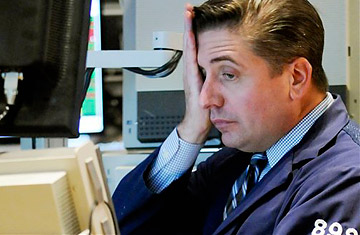
Specialist Thomas Laughlin works at his post on the floor of the New York Stock Exchange.
The amount of bad news over the past weeks has been bewildering for many people in the world. Stock markets have plunged, banks have stopped lending to one another, and central bankers and treasury secretaries appear daily on television looking worried. Many economists have warned that we are facing the worst economic crisis the world has seen since 1929. The only good news is that oil prices have finally started to come down.
While these times are scary and strange for many Americans, a number of people in other countries feel a sense of deja vu. Asia went through a similar crisis in the late 1990s, and various other countries (including Argentina, Turkey, Mexico, Norway, Sweden, Indonesia and South Korea) have suffered through banking crises, stock-market collapses and credit crunches.
Capitalism may be the best economic system that man has come up with, but no one ever said it would create stability. In fact, over the past 30 years, market economies have faced more than 100 crises. That is why I and many other economists believe that government regulation and oversight are an essential part of a functioning market economy. Without them, there will continue to be frequent severe economic crises in different parts of the world. The market on its own is not enough. Government must play a role.
It's good news that Treasury Secretary Henry Paulson seems to finally be coming around to the idea that the U.S. government needs to help recapitalize our banks and should receive stakes in the banks that it bails out. But more must be done to prevent the crisis from spreading around the world. Here's what it will take.
How We Got Here
The troubles we now face were caused largely by the combination of deregulation and low interest rates. After the collapse of the tech bubble, the economy needed a stimulus. But the Bush tax cuts didn't provide much stimulus to the economy. This put the burden of keeping the economy going on the Fed, and it responded by flooding the economy with liquidity. Under normal circumstances, it's fine to have money sloshing around in the system, since that helps the economy grow. But the economy had already overinvested, and so the extra money wasn't put to productive use. Low interest rates and easy access to funds encouraged reckless lending, the infamous interest-only, no-down-payment, no-documentation ("liar") subprime mortgages. It was clear that if the bubble got deflated even a little, many mortgages would end up under water — with the price less than the value of the mortgage. That has happened — 12 million so far, and more every hour. Not only are the poor losing their homes, but they are also losing their life savings.
The climate of deregulation that dominated the Bush-Greenspan years helped the spread of a new banking model. At its core was securitization: mortgage brokers originated mortgages that they sold on to others. Borrowers were told not to worry about paying the ever mounting debt, because house prices would keep rising and they could refinance, taking out some of the capital gains to buy a car or pay for a vacation. Of course, this violated the first law of economics — that there is no such thing as a free lunch. The assumption that house prices could continue to go up at a rapid pace looked particularly absurd in an economy in which most Americans were seeing their real incomes declining.
The mortgage brokers loved these new products because they ensured an endless stream of fees. They maximized their profits by originating as many mortgages as possible, with frequent refinancing. Their allies in investment banking bought them, sliced and diced the risk and then passed them on — or at least as much as they could. Our bankers forgot that their job was to prudently manage risk and allocate capital. They became gambling casinos — gambling with other people's money, knowing that the taxpayer would step in if the losses were too great. They misallocated capital, with massive amounts going into housing that was ultimately unaffordable. Loose money and light regulation were a toxic mixture. It exploded.
